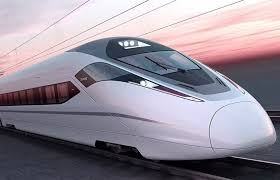BEML Secures Contract for India’s First Indigenous Bullet Trains
Introduction to the Historic Contract
BEML Limited, a public sector company, has achieved a significant milestone by securing a contract from the Indian Ministry of Railways for the design, manufacture, and supply of India’s first indigenous bullet trains. This groundbreaking initiative marks a new chapter in India’s railway history, showcasing the nation’s capabilities in advanced technology and manufacturing. The contract includes the production of state-of-the-art train sets that are expected to enhance the speed and efficiency of rail transport in the country.
Technical Features of the Indigenous Bullet Trains
The indigenous bullet trains are designed to operate at speeds of up to 300 km/h, significantly reducing travel time between major cities. These trains will feature modern amenities, including comfortable seating, onboard Wi-Fi, and advanced safety systems. The project emphasizes sustainability by integrating energy-efficient technologies, contributing to India’s goal of promoting green energy solutions. BEML’s partnership with various technology providers will ensure that the trains incorporate the latest innovations in rail transport.
Economic and Employment Opportunities
The successful implementation of the bullet train project is expected to boost the Indian economy by creating numerous job opportunities in manufacturing, engineering, and technology sectors. Local suppliers and vendors will benefit from this initiative, leading to an increase in domestic production and a reduction in reliance on foreign technology. The project aligns with the ‘Make in India’ initiative, encouraging self-reliance and innovation in the transportation sector.
Timeline for Implementation
The bullet train project is set to commence within the next few months, with an anticipated completion timeline of five years. This ambitious timeline reflects the government’s commitment to modernizing the rail infrastructure in India. The introduction of bullet trains is expected to revolutionize rail travel, providing a faster, safer, and more reliable mode of transportation for millions of passengers.
Challenges Ahead
While the project holds immense potential, it also faces challenges such as land acquisition, funding, and technical expertise. The government is working diligently to address these issues to ensure that the project stays on track. Continuous monitoring and assessment will be essential to overcoming obstacles and achieving the project goals.

Why This News is Important
Revolutionizing Rail Travel in India
The contract awarded to BEML for indigenous bullet trains is a landmark development that will revolutionize rail travel in India. It underscores the government’s commitment to modernizing infrastructure and improving connectivity across the country. The introduction of high-speed trains will not only enhance travel comfort but also promote economic growth by reducing travel time between major cities.
Alignment with National Initiatives
This project aligns with national initiatives such as ‘Make in India’ and ‘Atmanirbhar Bharat’ (self-reliant India), aiming to boost local manufacturing capabilities. By developing indigenous technology, India is taking a significant step toward reducing dependence on foreign technologies. This initiative will foster innovation, improve technical skills, and create a sustainable ecosystem for the railway sector.
Investment in Infrastructure Development
The bullet train project represents a substantial investment in India’s infrastructure development. Enhanced rail connectivity will lead to improved trade and commerce, facilitating the movement of goods and services across regions. This investment not only creates immediate job opportunities but also sets the stage for long-term economic benefits.
Enhancing Safety and Efficiency
With state-of-the-art technology, the indigenous bullet trains are expected to prioritize passenger safety and operational efficiency. Advanced safety features will minimize the risk of accidents, while faster travel times will improve overall efficiency in the transportation network.
Global Standing in Rail Technology
By successfully launching indigenous bullet trains, India will elevate its standing in global rail technology. This achievement will position India as a significant player in the international railway sector, potentially opening doors for future collaborations and export opportunities.
Historical Context
Evolution of Rail Transport in India
Rail transport in India has a rich history dating back to the 19th century. The first passenger train service began in 1853, marking the commencement of a robust railway network that has since expanded across the country. Over the years, Indian Railways has evolved to accommodate the growing demands of passengers and freight transport, integrating various technological advancements.
Previous Initiatives for High-Speed Rail
Before the current initiative, India explored several proposals for high-speed rail systems. The Mumbai-Ahmedabad High-Speed Rail Corridor was the first major step toward implementing bullet trains, with plans announced in 2015. However, the recent contract awarded to BEML signifies a major leap toward achieving indigenous capabilities in high-speed rail technology, reflecting a strategic shift in the country’s railway policy.
Global Context of Bullet Trains
Globally, countries like Japan and France have successfully implemented bullet train systems, significantly improving their transportation networks. India’s foray into this technology aligns with global trends, where nations are investing in high-speed rail as a solution for urban congestion and efficient travel.
Key Takeaways from “BEML Secures Contract for India’s First Indigenous Bullet Trains”
| Serial Number | Key Takeaway |
|---|---|
| 1 | BEML has secured a contract for India’s first indigenous bullet trains. |
| 2 | The bullet trains are designed to operate at speeds up to 300 km/h. |
| 3 | The project aims to boost local manufacturing and create job opportunities. |
| 4 | The introduction of bullet trains is expected to significantly reduce travel times. |
| 5 | The project aligns with initiatives like ‘Make in India’ and ‘Atmanirbhar Bharat.’ |
Important FAQs for Students from this News
1. What is the significance of BEML securing the contract for bullet trains?
BEML’s contract for bullet trains is significant as it marks India’s first indigenous development of high-speed trains, showcasing the nation’s technological capabilities and commitment to modernizing rail transport.
2. What speed are the indigenous bullet trains expected to operate at?
The indigenous bullet trains are designed to operate at speeds of up to 300 km/h, significantly reducing travel time between major cities.
3. How will the bullet train project impact employment in India?
The project is expected to create numerous job opportunities in manufacturing, engineering, and technology sectors, benefiting local suppliers and fostering economic growth.
4. What are some key features of the indigenous bullet trains?
Key features include comfortable seating, onboard Wi-Fi, advanced safety systems, and energy-efficient technologies to promote sustainability.
5. How does the bullet train project align with national initiatives
The project aligns with initiatives like ‘Make in India’ and ‘Atmanirbhar Bharat,’ promoting local manufacturing and reducing reliance on foreign technology.
Some Important Current Affairs Links

















